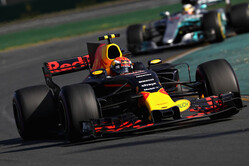


27/03/2017
NEWS STORY
 After months of speculation, the naysayers were proved right.
After months of speculation, the naysayers were proved right.
Though the sport got a different winner in the shape of Sebastian Vettel, despite the best efforts of broadcasters and sections of the media, the majority of the race proved to be no more exciting than last year, or the year before.
While any armchair or barstool expert will tell you that what would improve the racing is more mechanical grip and less reliance on aero, the sport went ahead with its plans to improve both, because those in charge know best.
As a result, as was perfectly demonstrated when Lewis Hamilton, desperate to take on Sebastian Vettel after the pit stops, was caught behind Max Verstappen, unable to make a move on the youngster due to the lack of grip the Mercedes suffered whenever it got too close to the Red Bull.
After months of speculation our worst fears were realised.
Indeed, the new rules appear to have made the racing worse as the turbulence behind the Red Bull made things so difficult for the three-time world champion he was never able to get close enough to make use of the dreaded DRS.
Indeed, the man who caused Hamilton such problems got his own taste of it in the latter stages of the race when he was unable to make a mark on Kimi Raikkonen, even though the Finn showed little taste for a scrap. The Dutch teenager claims he struggled whenever he was even 2s behind the Ferrari.
On an afternoon when the amount of passes - of all varieties - could be counted on one hand, the field was spread out over two laps at the end.
Indeed, after just a few laps the race was as processional as its predecessors, and while admittedly quicker, seemed none the better for the raft of new rules this year. After all, did the cars look quicker, especially on TV.
Speaking before the race, Jean Todt admitted that he feared the new rules wouldn't have the desired effect, and that the field would be as spread out and the result as predictable as ever.
"I am very much looking forward to seeing the race, but a bit nervous," he told reporters, "because I think that it will be too much difference between the cars during the race. So we should hope that the gap is able to be tightened."
It wasn't.
"We dream of having the first ten cars in seven or eight tenths and at the moment it is not yet happening."
It wasn't
"You have a lot of reasons for that, but clearly it is too big a discrepancy between the small budgets and bigger budgets, and the playing field should be much closer."
It wasn't.
"They look great," he smiled. "Probably overtaking will not be easy as we would hope it would be.
It wasn't
"Everybody wanted cars more difficult to drive. Are they more difficult to drive? I understand they are. Are they quicker in the corners?"
They were... but then came the straights.
It would be wholly wrong to write off the season before it has really begun, especially after the result gave the sport the kick up the rear it so badly needed.
What is so wrong however, is the continued failure of F1's powers-that-be to get it right, while every armchair expert and barstool technical director knew exactly what the new rules would mean.
Appropriately the season opener saw the launch of a new fan survey with the aim of passing fans' opinions on to those very powers-that-be.
Of course, in the real world we know that those within Planet Psaddock couldn't give a flying whatever about what the fans might think.
Indeed, if the previous fan survey in 2015 had the desired effect and the views of the fans were heeded, why the need for a second just a couple of years later?
A sceptic might suggest it was more about marketing and email addresses.
Like the saying, widely attributed to Mark Twain, goes: "If voting made a difference, they wouldn't let us do it."